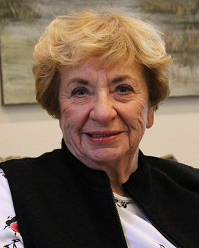Midge Renton is a familiar face around town. The retired teacher and elementary school principal is often greeted with smiles from former students in the grocery store or local shops. “Mrs. Renton, do you remember me?” And quite often, she does.

Thousands of working adults in Grants Pass were once under the watchful care of beloved Mrs. Renton. And they have much to thank her for. Besides her tireless work as an educator, Midge was also one of the original founders of Rogue Community College, which now trains hundreds of skilled workers every year for the benefit of our region’s economy. That means beyond teaching many local residents to read and write, Midge also gave our community a chance at a college education—and a better life.
When Midge first moved to Grants Pass from San Francisco in 1966, she fell in love with the beauty and camaraderie of Rogue Valley neighborhoods—but one thing was missing. “I asked, where is the community college?” Midge said. As a young woman, she graduated from UC Berkley but took advantage of her local community college for enrichment courses and continuing education. Her husband had also attended a community college after he got out of the military, before transferring to a four-year campus. For Midge, community college was both personal and sensible—a hub of local resources, culture, and affordable education.
She decided the Rogue Valley needed one.
In the late 60s, Midge, along with a team of other community advocates, formed a committee to petition for a community college in Josephine County. Midge was actively involved in collecting 1,000 signatures to convince the state board of education to place a referendum on the ballot for election. The board voted 4 to 3 in favor of allowing voters to choose whether or not they wanted a college. Ultimately, the referendum passed, and RCC was born.
“At first there was some discussion about calling it Rogue Vocational College, but we said no—we want both vocational training, like welding and car repair, and traditional education where students can transfer to four-year schools from our community college,” Midge recalled. This was partly a financial decision. “You can teach college English in a room with 25, but when you teach welding you’ve got one instructor for maybe 8 people. Every student pays the same tuition, so really, college transfer courses are more economical to provide. We can serve more students with fewer faculty.”
This focus on smart stewardship benefits the students and community as well. Midge is a firm advocate for affordable education, and she believes community college, with its lower tuition and opportunity for students to live at home, is hands-down the best “bang for your buck.”
“We hear a lot of students tell us, ‘I’m the first person in my family to go to college.’ Community college makes that possible for them. It opens up all sorts of avenues. It benefits the community because it puts more people to work at better pay. It brings up the bottom line. You’re going to make more when you know more to give at work,” she said.
Midge also believes community college provides a supportive environment that increases a student’s likelihood of success, especially compared to larger universities. “Years ago, I had a girlfriend who went to community college and got into the physical therapy program at Berkley. There were students who started at Berkley and didn’t get into the program at UC San Francisco,” Midge said. “Community college can provide small classes and individual attention that help students succeed. They really care.”
After RCC was built, Midge served on the RCC advisory board for 28 years. Over the past five decades, she’s seen a lot of growth and change. “When we started, there were no computers,” she recalled. “That was amazing, to see the campus get computers and then we started creating training programs for computers.” Today RCC offers several computer programming and technology degrees—something nobody dreamed of when the original campus was founded.
In 1998, Jackson County joined RCC and the college expanded to three times its size, with multiple facilities and a growing body of students from across two counties and beyond. Midge says the continuous growth has been healthy for the community and especially for women.
“As an elementary school principal, you tend to get into counseling a lot,” Midge explained. “Parents would come into my office, most of the time it was women, moms. They’d say, ‘My husband left me, what should I do?’ And I’d say, go to the college.” One of those women actually ended up teaching at RCC.
Midge spent 25 years post-retirement mentoring high school students and encouraging them to attend RCC. She served on the board of the RCC Foundation and saw it grow from humble beginnings to a $10 million endowment. She has lived in the same house in Grants Pass for the past 54 years, where she and her husband raised three sons and established a lifetime of community involvement. She still serves as a champion for RCC and all it stands for.
“My husband and I were the first in our families to go to college,” Midge said. “Education brings opportunity. We’re living proof of that.”
Several years ago, Midge had a conversation with one of the state board of education members who had voted down the RCC ballot proposal in 1968. He looked her in the eyes—and apologized.
“We know now how RCC has proven its value in the Rogue Valley, like many of us believed it would,” Midge said. “But years ago it was quite an unknown, which made it a controversial issue. Of course—we’re happy with how things turned out.”
For more information about RCC’s 50-year history and celebration, visit www.roguecc.edu/rcc50.
